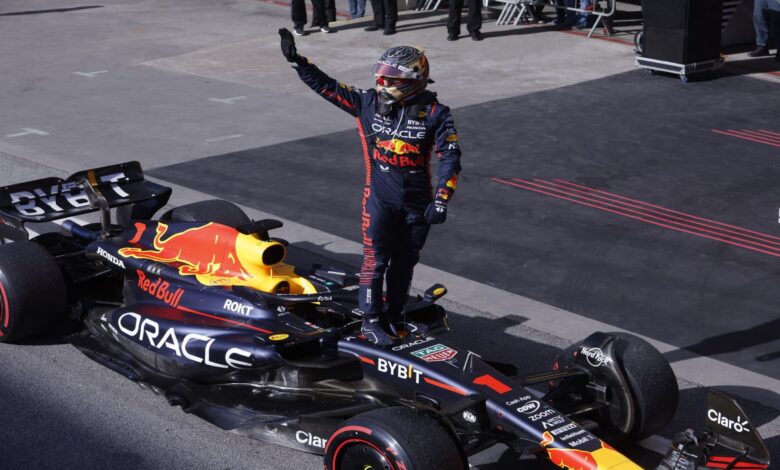Red Bull F1 dominance boosts energy drink sales

Red Bull’s Max Verstappen celebrates after winning the Brazilian Grand Prix on Nov. 5, 2023.
Amanda Perobelli | Reuters
Red Bull Racing’s dominance in Formula 1 this year is translating directly to higher sales of its namesake energy drink, the team’s principal and CEO, Christian Horner, told CNBC.
“There’s an old adage of, ‘Win on Sunday and sell on Monday.’ Well, what we do for the Red Bull brand, for the energy drink in advertising the product globally for 23 race weekends a year, we’re the biggest marketing impact that the beverage company has,” Horner told CNBC’s Sara Eisen in the documentary “The Inside Track: The Business of Formula 1.”
The Red Bull team, which also counts tech giant Oracle as a title sponsor, has trounced the grid this season, winning 19 of the 20 Grand Prix weekends so far. Its world champion driver, Max Verstappen, has taken the checkered flag on 17 of those wins, with his teammate Sergio Perez collecting wins in Saudi Arabia and Azerbaijan.
Verstappen already clinched the 2023 drivers title — his third world championship — in early October during the 17th Grand Prix weekend of the season, in Qatar. The Red Bull team secured the constructors championship the weekend prior, in Japan.
The drivers will take to the track again on Sunday in Las Vegas before the season wraps at the end of this month in Abu Dhabi.
Red Bull declined to share specific sales metrics, but a company spokesperson reiterated the F1 “uplift” and said it’s particularly noticeable in corresponding race markets.
“They see it, they can measure it. It’s incredible the amount of consumption of Red Bull that is happening,” Horner told CNBC.
Red Bull is the second-most popular energy drink brand in the world, with 13% market share, according to Euromonitor International data. It trails only Monster Beverage‘s namesake brand, which holds 16.4% of the global market share.
But the market for energy drinks has grown more crowded, putting pressure on Red Bull. The company’s market share has slipped from 13.5% in 2021 to 13% this year as newer players, such as PepsiCo, enter the category.
In recent years, beverage giants Coca-Cola and Pepsi have both set their sights on the fast-growing energy drink category — with varying degrees of success. Soda consumption has decreased over the last two decades, but sugary energy drinks have bucked the trend because of their caffeine content and related effects.
Coke launched its own energy drink in the United Kingdom in 2019. But Coke Energy failed to gain a foothold with U.S. consumers; the company discontinued the drink in North America in 2021, roughly a year after it launched.
Coke rival Pepsi has found more success through deal-making. It bought Rockstar Energy for $3.85 billion in 2020, gaining ownership of both the company’s namesake energy drink and fast-growing Sting Energy.
Last year, Pepsi took a $550 million stake in Celsius, which markets itself as a healthier energy drink that boosts workouts. Those deals are on top of efforts such as shifting Mountain Dew into the energy drink category and adding caffeine to Gatorade.
Find replay times of “The Inside Track: The Business of Formula 1” on CNBC.
Source link



